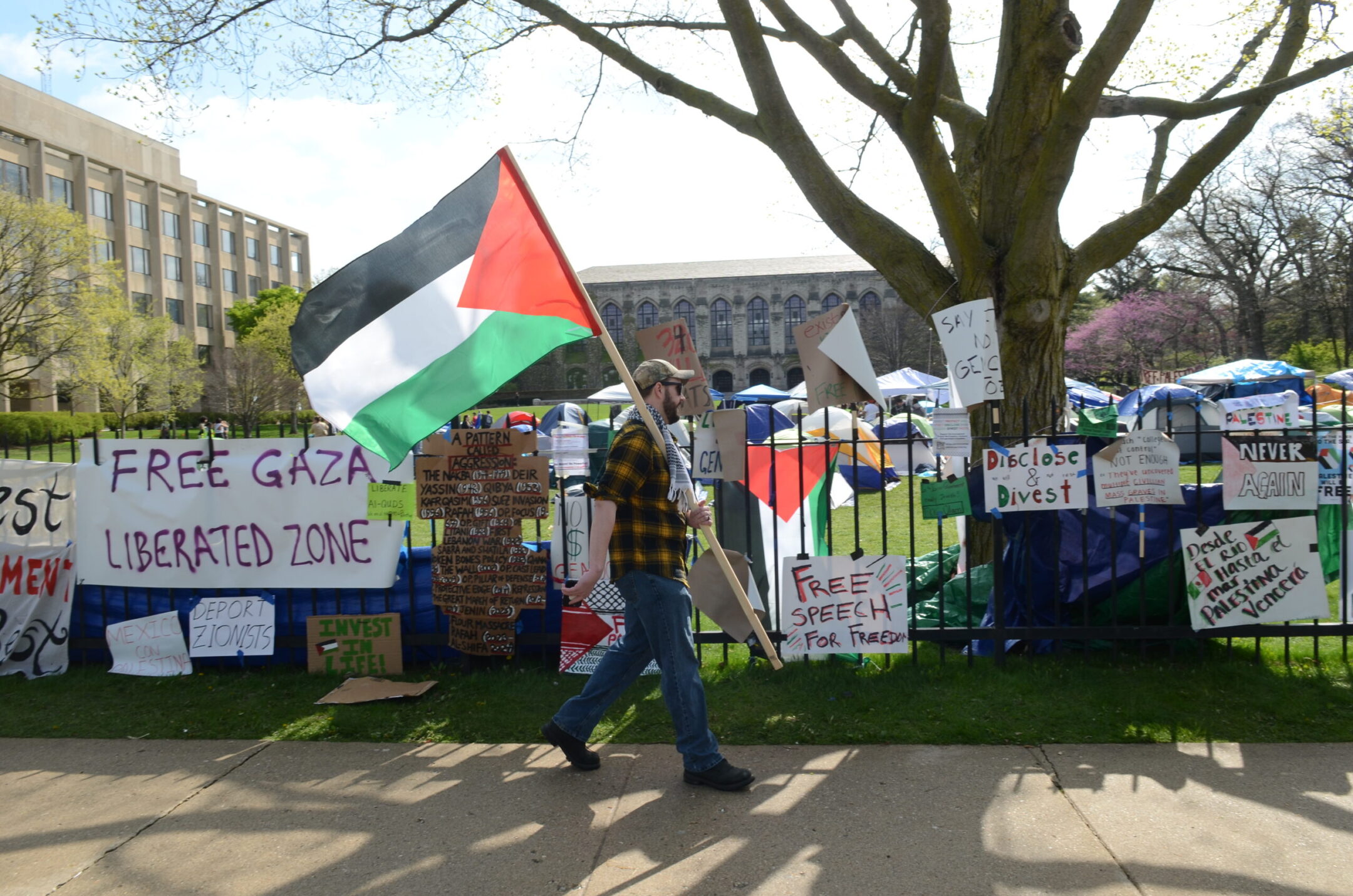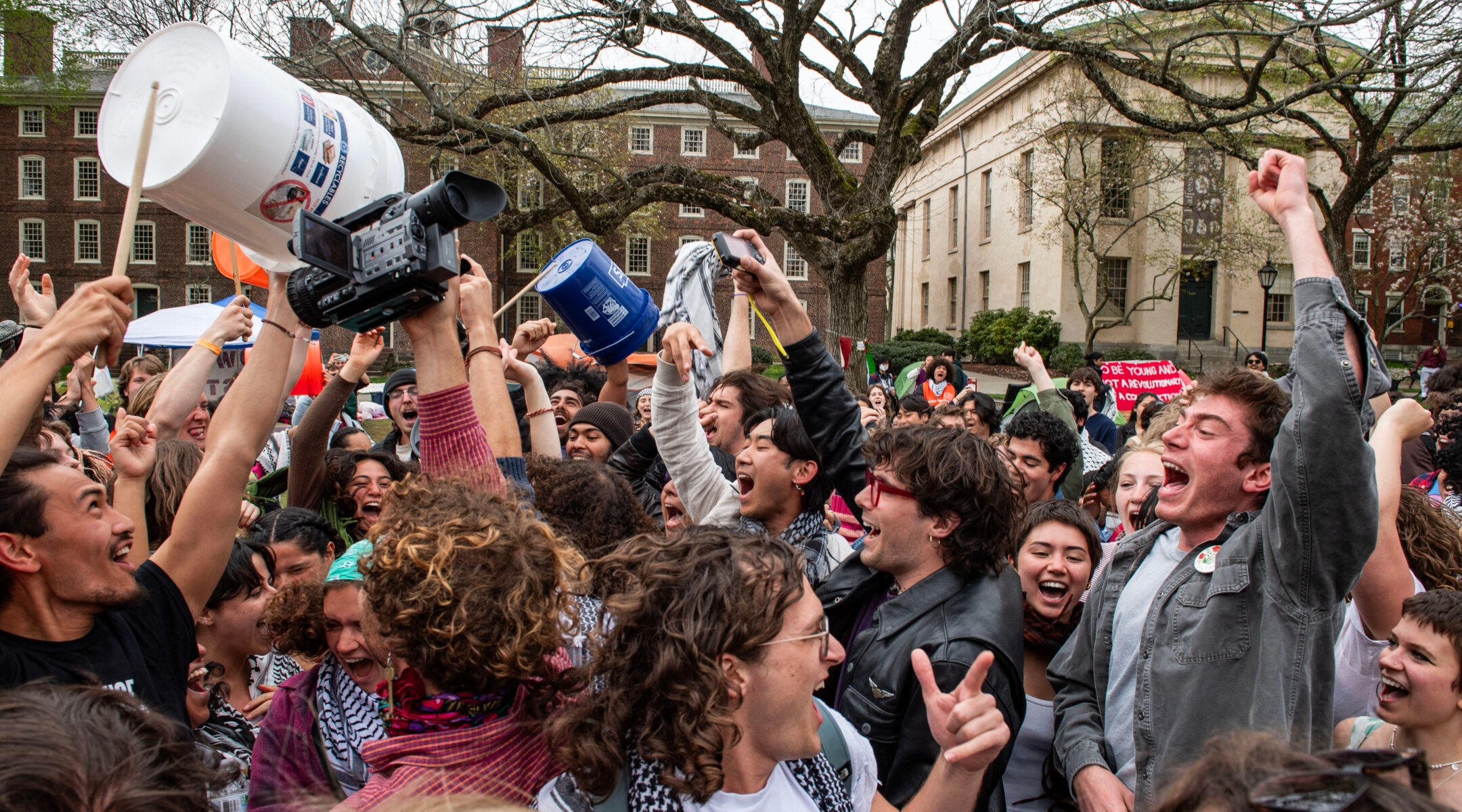(JTA) – While hundreds of Israel protesters on campuses across the country came to blows and arrests continued to mount this week, students in Providence, Rhode Island, faced a calmer reality on Wednesday.
There, the tents in the pro-Palestinian demonstration came down peacefully. And the organizers of the “Gaza Solidarity Encampment” celebrated, dancing and partying on Brown University’s Main Green.
That’s because they achieved a landmark victory: In exchange for ending their encampment now and pausing all future campus actions through commencement, Brown’s administration agreed that its board would vote in October on whether the university should divest from companies that do business in Israel.
For decades, dozens of student governments have voted symbolically to divest from Israel but have gained no traction with the university administrations with the power to act on their wishes. Brown is the first school to ever agree to a divestment vote — a key demand of the students and other members of the nationwide movement opposing Israel’s ongoing military campaign in Gaza.
“We’ll see a peaceful end to the unauthorized encampment,” Brown President Christina Paxson wrote Tuesday in an open letter announcing the agreement. She added, “I feel strongly that a vote in October, either for or against divestment, will bring clarity to an issue that is of long-standing interest to many members of our community.”
Through a spokesperson, Paxson, who is Jewish, declined to speak with the Jewish Telegraphic Agency. In her letter, she also expressed hope for “a full and frank exchange of views” at the planned October meeting of the Brown Corporation, the school’s board.
More broadly, the moment heralded something of a turning point for relations between university administrations and the encampment protesters, whose movement has only grown in the two weeks since the first tents were pitched on Columbia University’s campus. Many schools have turned to police to clear encampments, some after unsuccessful negotiations between protesters and administrators; Brown itself arrested more than 40 students during a sit-in to push for divestment in December.
But at a few schools — including Brown, Northwestern, The Evergreen State College and Portland State University — the two sides have succeeded, at least to some degree, in reaching agreements to keep the campus climate under control.
The Brown agreement earned praise from one campus stakeholder who staunchly opposes divestment — Rabbi Josh Bolton, director of the Hillel serving both Brown and the Rhode Island School of Design. Bolton said the existence of the encampment was bad for Jews on campus, and the Jewish community should celebrate its peaceful dismantling.
“We will not be seeing the police and guards tearing down encampments as we’ve seen on other campuses, and ultimately, that’s good for our community,” he said. “And ultimately ending the encampment is good for our community.”
The Brown agreement allows for five students chosen by the encampment’s organizers to meet with the board to make the case for divestment. An advisory committee will also present Paxson with its own recommendation on the issue. The proposal in the agreement is based on one Brown considered in 2020 but rejected the following year, in which 11 primarily military-based companies — including Boeing, Airbus, Raytheon and Northrop Grumman — were proposed for possible divestment on the basis of Israel’s settler activity in the West Bank.
The new agreement was signed by members of the Brown Divestment Coalition — including leaders of Jews For Ceasefire Now, a pro-Palestinian campus group that saw 20 of its members arrested. “While we acknowledge that this is by no means a total victory, we celebrate this step in the fight for divestment, and further, Palestinian liberation,” the Jewish group, which did not reply to a JTA request for comment, wrote on Instagram Wednesday.
The university rejected a separate demand from the students that it not prosecute the students arrested for protesting on campus in recent months.
Yet supporters of the encampment are still celebrating.
“I’ve been very impressed with the fact that the students were finally able to get divestment on the table,” Jackie Goldman, a staff member at Brown’s School of Public Health who is Jewish and has been part of campus pro-Palestinian protests but was not an active part of the encampment, told JTA. “They’ve been organizing on this for a really long time and it’s definitely a win.”
Student protester demands regarding divestment at other campuses have tended to push for a total break with any company that has a relationship with Israel or invests in a company that does. Brown’s vote will be more targeted, with a focus on the 2020 proposal, which made it more appealing for the university to agree to, according to Chris Marsciano, a professor of education policy at Davidson College.
“It’s pretty hard to divest more broadly by targeting specific companies,” Marsciano said, adding that while Brown’s proposal was “more likely than other divestment efforts to happen,” he still emphasized that the situation could change drastically by October.
“This is a win for protesters in some way, but at the end of the day I sincerely doubt this will affect much of the war effort in Israel,” Marsciano said.
At Northwestern, protesters also dismantled all but one tent related to their encampment this week after reaching an agreement that called for the school to meet several demands, including reestablishing a dormant committee tending to “investment responsibility,” renovating a center for Muslim, Middle Eastern and North African students and committing to bringing more “at risk” Palestinian students and faculty to campus.

Banners hanging from the fence outside Northwestern University during a pro-Palestinian protest, Evanston, Illinois, April 27, 2024. (Jacek Boczarski/Anadolu via Getty Images)
A request for comment to a university spokesperson was not returned, but the school’s Jewish president, Morton Schill, said in a video, “I am proud of our community for achieving what has been a challenge across the country: a sustainable de-escalated path forward.” Schill also condemned antisemitic actions at the encampments, including one image depicting him with devil’s horns.
A representative for The Evergreen State College in Olympia, Washington, confirmed to JTA that the school had also reached a divestment-related agreement with protesters, who agreed to dismantle their encampments Wednesday. The school says it will form multiple “disappearing taskforces” made up of both students and faculty, including one that will propose changes to its socially responsible investment policy, with a special focus on Israel.
Meanwhile Portland State, in Oregon, attempted to broker a similar deal with protesters who occupied and vandalized a campus library over the weekend, with the president agreeing to incorporate Palestinian content into the school’s ethnic studies requirement and make a “personal donation” to the school’s Middle Eastern, North African and South Asian student center. Yet protesters remained in the library as of Wednesday, leaving the terms of the agreement on hold, a university spokesperson said.
(Separately, the university has agreed to “pause” all financial support it receives from Boeing after the school’s pro-Palestinian student coalition demanded it “cut all ties” with the embattled airplane manufacturer.)
But unlike Brown, neither school has agreed to hold a formal vote on divestment. Even the prospect of such a vote was enough to draw the ire of some Jewish groups, with the regional Anti-Defamation League office decrying Brown’s agreement as “a path of capitulation rather than condemnation” that was “validating a movement rife with antisemitism and hate.” (The ADL also denounced the Northwestern agreement as “reprehensible” and “dangerous.”)
Bolton was optimistic about how the vote would ultimately play out. The Hillel director said the issue was too contentious on campus for the university to seriously consider making such a “radical change” to its policies. Whether the school could even divest legally is an open question: Rhode Island is one of dozens of states that have passed laws prohibiting any financial association between the state government and companies that boycott Israel.
“Brown is not going to divest from Israel. Brown was never going to divest from Israel,” Bolton told JTA, adding that he would be taking a “wait and see” approach regarding the fall vote. “October is a cosmos away,” he said.
Before then, the university will see a tangible investment in its Jewish community, as Brown/RISD Hillel will break ground on the first stage of a new $10 million renovation project for its Jewish center, including a worship space that will incorporate elements from historic Eastern European synagogues.
The head of Brown’s Chabad center, too, praised the school’s administration without commenting on the agreement.
”I’m very grateful to President Paxson for her leadership over these years and for working to make Brown a space where Jewish students feel welcomed and supported,” Rabbi Menachem Mendel Laufer, co-director of Chabad of College Hill, told JTA. “I think it’s a great Jewish space now, and I think it’s going to be even better.”
Jewish leaders said that Brown remains a safe and thriving place for Jewish students today. And, Bolton hopes, actually putting divestment to a vote could help quell the unrest on campus by demonstrating that there is not as much popular support for the idea as protesters think.
“In some ways, it’s good to have votes happen,” he said. “Because we can then really check and get a better and better sense that, in fact, this is a contended issue.”
JTA has documented Jewish history in real-time for over a century. Keep our journalism strong by joining us in supporting independent, award-winning reporting.






